World Oceans Day 2023
World Oceans Day takes place on 8 June each year as a global celebration of the ocean, marine life and all ocean activities. World Oceans Day was first declared at the 1992 Global Forum in Rio de Janeiro, with the aim to bring the ocean to the center of global discussions and policy decision-making processes, and to strengthen the voice of ocean and coastal constituencies worldwide. For the United Nations and its partners, World Oceans Day is a day for scientists, policy-makers and citizens to grow closer and interact around the key and emerging challenges our ocean faces today.
The theme of the World Oceans Day in 2023 is “Planet Ocean – Tides are changing”. To mark this day, ISA hosted its third World Oceans Day art competition on the theme “Mysteries of the Abyss”, including a local competition for elementary school students under age 16 in Jamaica and a global competition for participants worldwide from age 16 up. The winners were announced on 8 June during ISA’s celebrations of World Oceans Day.

Click here to access event information.
Winners of ISA art competition
The International Seabed Authority is pleased to announce the winners of its art competition organized for World Oceans Day 2023 in two categories, international and local.
International competition
open to everyone around the world over the age of 16
First prize
Kamaal Manboard, 37, from Jamaica
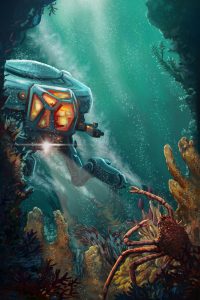
Description
We are transported into the mesmerizing depths of the ocean’s abyss. The piece depicts a submersible, suspended in the darkness, reaching out its mechanical arm towards a magnificent and colossal deep-sea crab. The scene is illuminated by the eerie glow of hydrothermal vents, casting ethereal shadows and revealing a world teeming with vibrant marine life on the ocean floor. The submersible, bathed in light, represents humanity’s quest for exploration and understanding of the ocean’s mysterious and often inaccessible depths. Its outstretched arm symbolises curiosity and the desire to connect with the enigmatic creatures that inhabit this alien realm.
Second prize
Kimingi Tewis, 30, from Kenya
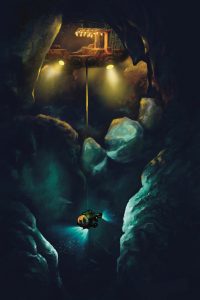
Description
The Mariana Trench in the Pacific Ocean is the deepest point on Earth. According to the Exclusive Economic Zone (EEZ), the United States has jurisdiction over the trench and its resources. Scientists use a variety of technologies to overcome the challenges of deep-sea exploration while exploring the Trench, at about 11,000 m (about 7 miles) depth. Very few people have been to the bottom if ever, and those that do, don’t stay for long due to the immense pressure. Exploration is mainly done with remotely controlled vehicles. Our oceans, while they cover the largest parts of our planet, are also the least explored. If I had a wish, it would be to be counted amongst those that have been to the deepest part of the Earth and live to talk about it.
Third prize
Wanni Arachchige Damitha Nayananjani Monarawila, 28, from Sri Lanka
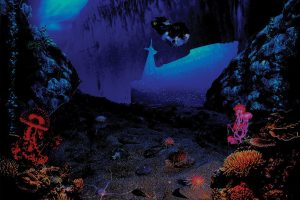
Description
The seafloor and water column from 3,000 to 6,500 meters (9,842 to 21,325 feet) depth is known as the abyssal zone, or the abyss. Sunlight doesn’t penetrate to these depths, so the waters here are extremely dark, and the animals that live here often use bioluminescence to communicate. The seafloor itself consists of large plains broken by trenches, sea mounts, and oceanic ridges. These features are the result of geologic activity.
Local competition
open to school children under the age of 16 in Jamaica
First prize:
Amanda Emmanuel, 13
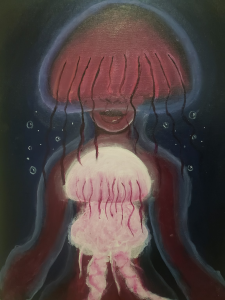
Description
I decided to base my piece off real and imaginary creatures. I decided to paint a jelly mermaid with a glowing jellyfish in front of her. The jellyfishes that she’s inspired by are the phantom jellyfish and the black sea nettle. She’s inspired by the phantom jelly because they are rare to find because they live in the deep, and also the black sea nettle in terms of her design elements. I made the background dark with a bit of blue to show her bioluminescence in the dark. I decided to take a mythical approach because over eighty percent of the ocean is unmapped, unobserved and unexplored, we have no clue of what might lie in the deep abyss of the ocean. This art piece was started on 20 May and was completed on 25 May. I decided to call my artwork “jellies in the deep ”.
Second prize:
Shaniquea Williams, 15
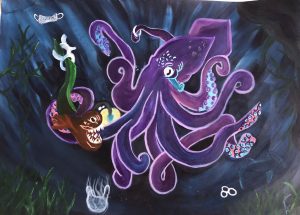
Description
“Mysteries of the abyss”. In my eyes this phrase symbolizes deep and weird ocean creatures. My piece depicts two deep-sea creatures, a combination of four species and is situated in the Bikini Atoll. The combinations are of an octopus and a squid (named Squadtapus), and the next, an angler fish and an eel (named Angleel). This painting serves as an exaggeration of humans’ negative impacts on the ocean and how deep said negative impacts can go. The combinations of four species are because of radioactive waste pollution, which causes mutations, as seen in the painting. The reason for the creatures’ vivid, glowing-like colours is still unknown, but can be theorized that the cause is consuming other radioactive creatures and the limitation of sunlight.
Third prize
Georgian Watson, 16
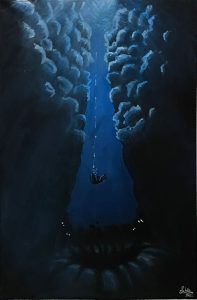
Description
This art piece is about a young girl falling into the abyss. The piece is about a girl that wonders about the mysteries of the abyss. A young girl was told many stories about the abyss near her village, how it’s full of darkness and the number of lives that were drowned there, it was said to be bottomless and filled with dangerous creatures. She was a bit terrified and started to get curious about it, but she was told not to go down there. As weeks went by, the stories of the abyss were haunting her. Despite the warnings, she couldn’t resist the allure of the abyss. So one day she decided to swim in the abyss…


